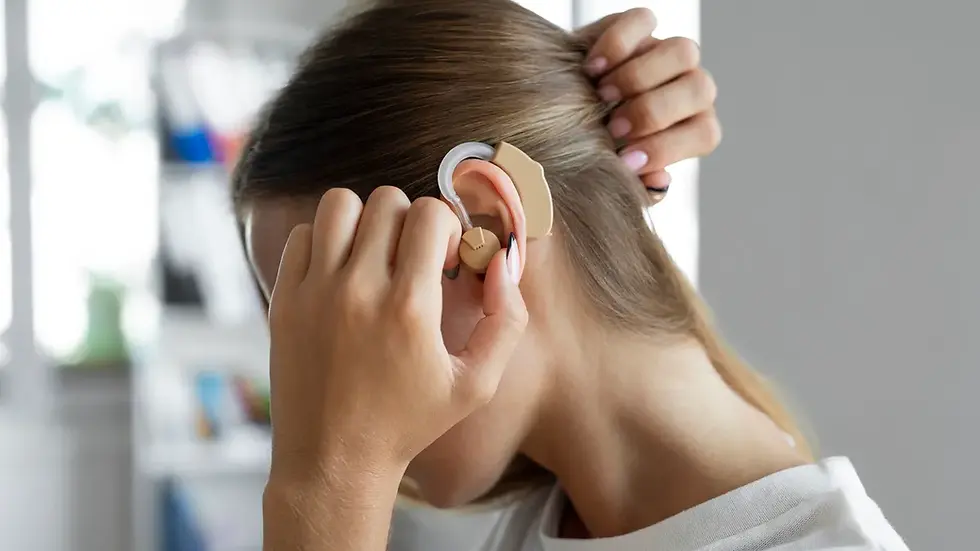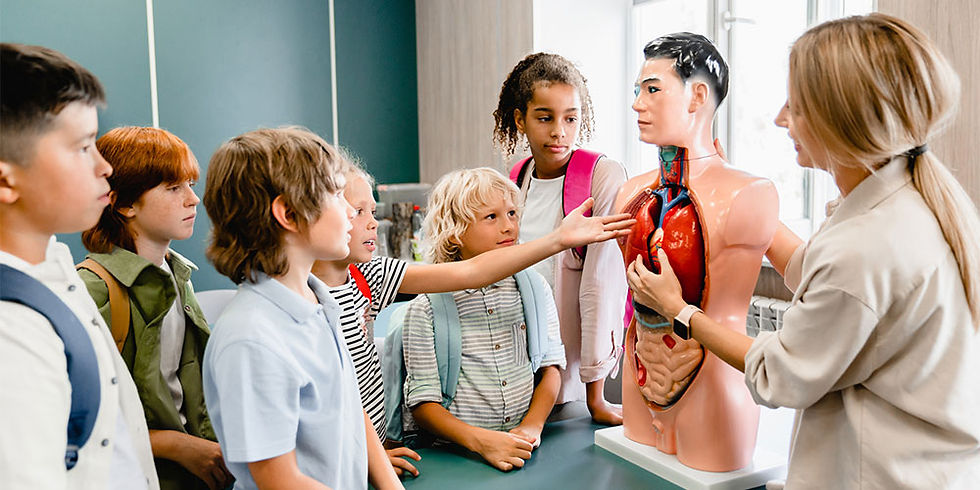I Needed Hearing Aids at 8. Here’s What Insurance Didn’t Cover
- Brianna Lane

- Mar 5, 2025
- 4 min read
Updated: Jun 8, 2025
When I was diagnosed with neuroblastoma at the age of 4, the world I knew changed forever. The chemotherapy, the radiation, and the stem cell transplant were all part of the battle to survive the relentless, aggressive cancer. But what no one told me back then was that the price of survival wasn’t just measured in the toll it took on my body and my time, it would also be reflected in my hearing. By the time I was 8 years old, I realized that the world around me was growing quieter. The sounds I had once taken for granted, my mom calling my name from the other room, the clink of silverware on a dinner table, or the sound of birds chirping outside, started to fade into the background. The chemotherapy had taken more than just my energy and strength. It had robbed me of something crucial: my hearing. It wasn’t until a routine check-up with my audiologist that the severity of my hearing loss became clear. The combination of high-dose chemotherapy and radiation had caused permanent damage to my auditory system, a side effect of the aggressive treatments used to save my life. It was devastating to hear that the hearing loss I had already started to notice was irreversible. At 8, I was diagnosed with severe hearing loss, and the solution to restore the sounds I had lost was hearing aids. But that’s where the trouble began.
When my audiologist recommended hearing aids, I didn’t fully understand the financial burden they would place on my family. Hearing aids, while life-changing, are not cheap. On average, hearing aids can cost anywhere from $1,000 to $8,000 per device, depending on the brand, model, and level of sophistication. And since I needed two devices to hear properly, the costs quickly added up. What made this situation even more complicated was the fact that my health insurance, which had covered the majority of my cancer treatments, didn’t offer much support when it came to my hearing aids. Despite my condition being a direct result of the cancer treatment I had undergone, the insurance companies had drawn a hard line: hearing aids were considered a “luxury,” not a medical necessity.
It’s common knowledge that insurance companies can be difficult to navigate, but the exclusion of hearing aids from coverage was a painful shock. Even though my hearing loss was a direct consequence of my cancer treatments, treatments that were life-saving, mind you, my insurance refused to cover the full cost of the hearing aids. They argued that hearing aids weren’t a treatment for an illness, but rather a device for improving hearing, which they deemed non-essential. For a pair that cost around $8,000, insurance covered only $2,000, leaving my family with a $6,000 gap to fill. What the insurance companies didn’t seem to understand was that hearing aids were far from a luxury for me. They weren’t simply a convenience; they were a necessity for me to function in the world. Without them, I struggled in school, felt isolated from my friends, and had difficulty communicating with my family. The devices weren’t just an accessory, they were a lifeline. The gap in insurance coverage meant that my family had to foot the bill for the hearing aids. As a child, I didn’t understand the complexity of the situation, but looking back, I know that this added cost added to the weight of the challenges we were already facing. The cost of the hearing aids was compounded by frequent check-ups, adjustments, and ongoing support.
Hearing aids may have restored my ability to hear the world around me, but the impact of hearing loss has shaped my entire life. As a young child, it was isolating to struggle with something so fundamental to communication. It wasn’t just the loss of sound- it was the social stigma, the feeling of being different from my peers. I was already navigating the world as a cancer survivor, but now I had to contend with the challenges of being hearing impaired as well. Even with hearing aids, I found myself constantly asking people to repeat themselves, struggling to hear in noisy environments, and becoming frustrated when I couldn’t participate in conversations. It was tiring and emotionally draining to have to work so hard to hear, especially when I had just survived something as life-altering as cancer. But the hearing aids did make a difference. They helped me feel more connected to the world, to my friends, and to my family. They allowed me to participate more fully in school and social activities. In a way, they gave me back a part of my childhood that had been taken from me by the ravages of cancer treatment.
The system that we rely on to cover medical expenses often fails those of us who have survived life-threatening diseases. Health insurance should not draw a line between life-saving treatments and devices that are essential for quality of life. When the treatment of one condition, cancer, in my case, leads to another health challenge, such as hearing loss, there should be continuity in care. If the treatments designed to save us also lead to lifelong disabilities, shouldn’t the insurance system step in to help cover the costs of managing those disabilities? Instead, I was left to navigate a system that seemed to prioritize short-term savings over the long-term well-being of survivors like myself. The absence of coverage for hearing aids left me with the reality that, while my life had been saved, the cost of surviving cancer was far from over.
My experience with hearing loss and the lack of insurance coverage for hearing aids is not unique. Many survivors of childhood cancer face similar challenges, struggling with secondary conditions caused by their treatments. But the healthcare system is slow to adapt to the needs of cancer survivors, often failing to account for the long-term effects of treatments. The solution is simple: Insurance should cover the costs of hearing aids, especially for those whose hearing loss is a result of life-saving cancer treatments. The medical community needs to recognize the long-term consequences of cancer treatment and ensure that survivors have access to the tools they need to live full, active lives. For survivors like me, hearing aids are not a luxury; they are a necessity. And no one should have to fight for the right to hear.










Comments